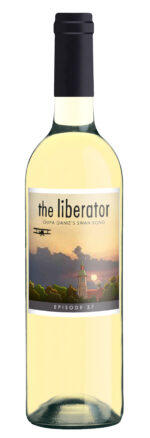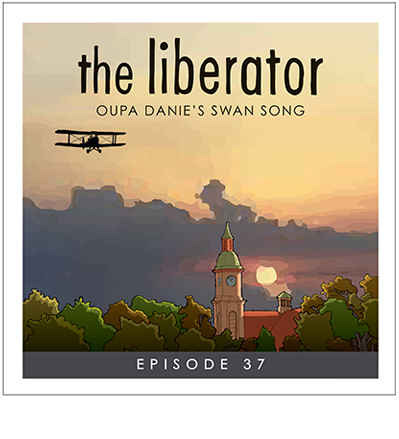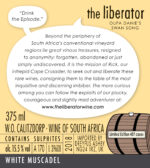Episode 37 – Oupa Danie’s Swan Song
Technical Information:
| Producer: | Boplaas |
| The Wine: | Muscat de Frontignan |
| Vintage: | 2018 |
| Wine of Origin: | Calitzdorp |
| Alcohol: | 15.5% |
| Bottles: | 407 cases (375ml) |
| Released: | February 2023 |
‘The changing fortunes of the Nel family have followed the fluctuations of prosperity and depression in the Cape’s agricultural economy. The Nels of the Calitzdorp area have shown resilience in the face of hardship and audacity in surmounting misfortune. They have created opportunities, taken risks, defied authority, and in some cases hung on to the bitter end.’ – Graham Knox, ‘Estate Wines of South Africa’ 1982
Situated in the picturesque valley of the Gamka River, on the edge of the sleepy town of Calitzdorp, Boplaas was formally part of a larger property farmed by Chris and Danie Nel. Their grandfather had bought the farm back in 1890.
History tells us that the first Nel to arrive in the region was named Louis. He took a 5,000 hectare lease in the area in 1760, renting land from the Dutch East India Company. Legend has it that no rent was paid for the first seventeen years of his tenure. It’s not recorded as to whether he did pay the full amount eventually, but the Company allowed him to keep the farm anyway.
Vineyards were first established in 1936 with brandy, sweet wines and sun-dried raisins being produced, primarily for export to Britain. Until then, their main source of income had been the breeding of ostriches. The market for their feathers started in around 1880 and the Nel’s made a small fortune from this business, until World War One curtailed such exports to Europe and the fashion finally ending by 1918.
The farm was divided in 1980, with Chris and his son, Boets, retaining 33 hectares of the original Die Krans farm, while Danie and his son, Carel, settled on the subdivision, allowing the two cousins to have more control over the eventual succession of the property.
Today, it is Margaux, Danie’s own granddaughter, who takes charge of the winemaking.
Oupa Danie was considered Calitzdorp royalty and a bon vivant in the truest sense of the word. A farmer who liked farming. And flying…
After doing zero checks on his Cessna, he’d take a low-flying flip (during the hours of daylight only, since he had no licence to fly at night), around the Klein Karoo.
It’s a fact that Carel secured a pilot’s licence before he passed his driving test…
Muscat de Frontignan remains an integral part of Calitzdorp’s legacy, and Oupa Danie’s Swan Song is no exception. It’s a style that would have been produced the same way that Danie’s own grandfather would have made it: the crushed grapes were allowed to remain in contact with the skins for two days with an occasional punch-down. A little bit of wild ferment would be allowed to occur, before being fortified whilst still on the skins, with 96% proof spirit and then pressed.
Described locally as a visolie and diesel-grease style of Muscat, the wine has great viscosity, with evidence of the extended skin contact and influence of the dusty, red dirt of the Karoo. With a heady 250 grams of residual sugar, the wine could be expected to last for longer than humanity itself.
First planted by Danie as bush vines in the early 1980s and located next to the river in deep red soil, ideal for achieving good concentration in the Muscat grapes. The vineyard was kept nourished by way of flood irrigation, pumping good, clean water out of the Gamka.
The story goes that dagga was once planted here, used to feed to the horses, with bushes as big as trees…
But sadly, this is the last vintage. A true Swan Song.
Carel and Margaux were always quietly confident that the vines would survive tough times. The vineyard has already survived two floods and a minor drought. But the Gamka had now run dry for six years, and with just 40mm of rain during the 2017/2018 growing season, not even these hardy, stoic vines could survive.
It was the deep, alluvial clay soils of the Swartberg that would ironically be their downfall. The prolonged drought had caused the roots to fracture and split, as the ground compacted as hard as concrete but were still an impressive 3.5 metres deep when they were finally ripped out.
So, raise a glass to Oupa Danie. Farmer, aviator and legend of the Klein Karoo.
Afrikaans Lesson #22:
Oupa – grandfather
Afrikaans Lesson #85
Dagga – the colloquial term for cannabis
Afrikaans Lesson #61
Visolie – Fish Oil





